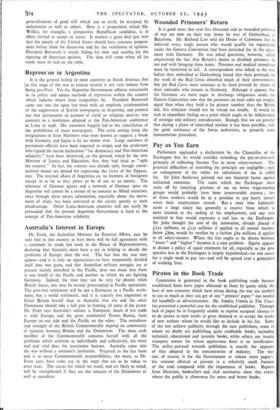Australia's Interest in Europe
Dr. Evatt, the Australian Minister for External Affairs, may be sure that in this country at least there will be full agreement with a statement he made last week in the House of Representatives, declaring that Australia must have a say in helping to decide the problems of Europe after the war. The fact that the war may appear—and it is only an appearance—to have temporarily divided itself into two parts, and that Australian military energies are at present mainly absorbed in the Pacific, does not mean that there is one world of the Pacific and another in which we are fighting Germany. Indeed, the time may not be very far distant when British forces, too, may be mainly preoccupied in Pacific operations. The post-war settlement will be not a European or a Pacific settle- ment, but a world settlement, and it is scarcely less important to Great Britain herself than to Australia that she and the other Dominions should take a full part in framing all parts of the peace. Dr. Evatt says Australia's culture is European, much of her trade is with Europe, and the great continental Power, Russia, faces Europe on one side and the Pacific on the other. The soundness and strength of the British Commonwealth depend on community of interests between Britain and the Dominions. The more each member of the Commonwealth concerns herself with all the problems which confront us individually and collectively, the more real and vital does the association become. Australia came into the war without a moment's hesitation. Prepared as she has been and is to incur Commonwealth responsibilities, she must, as Dr. Evatt says, have some say in the steps that are to be taken to avert wars. The causes for which we stand, and are likely to stand, will be strengthened if they are the concern of the Dominions as well as ourselves.


























 Previous page
Previous page